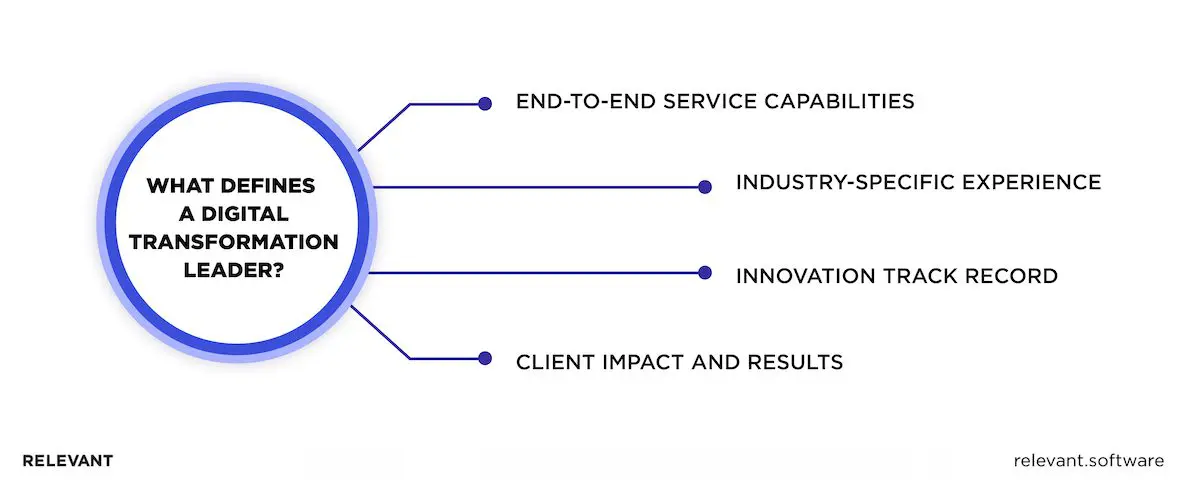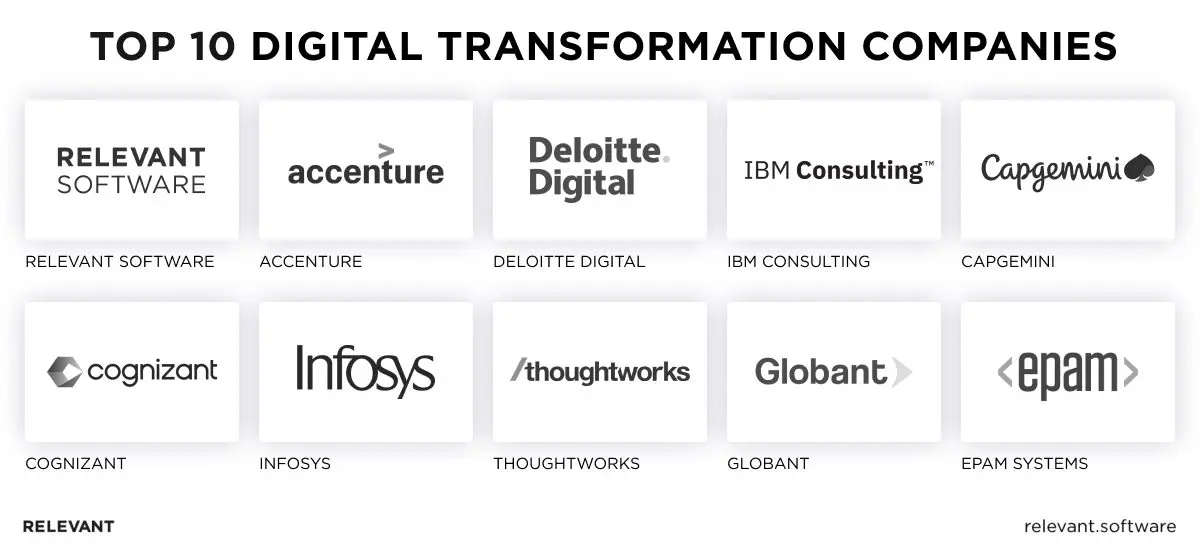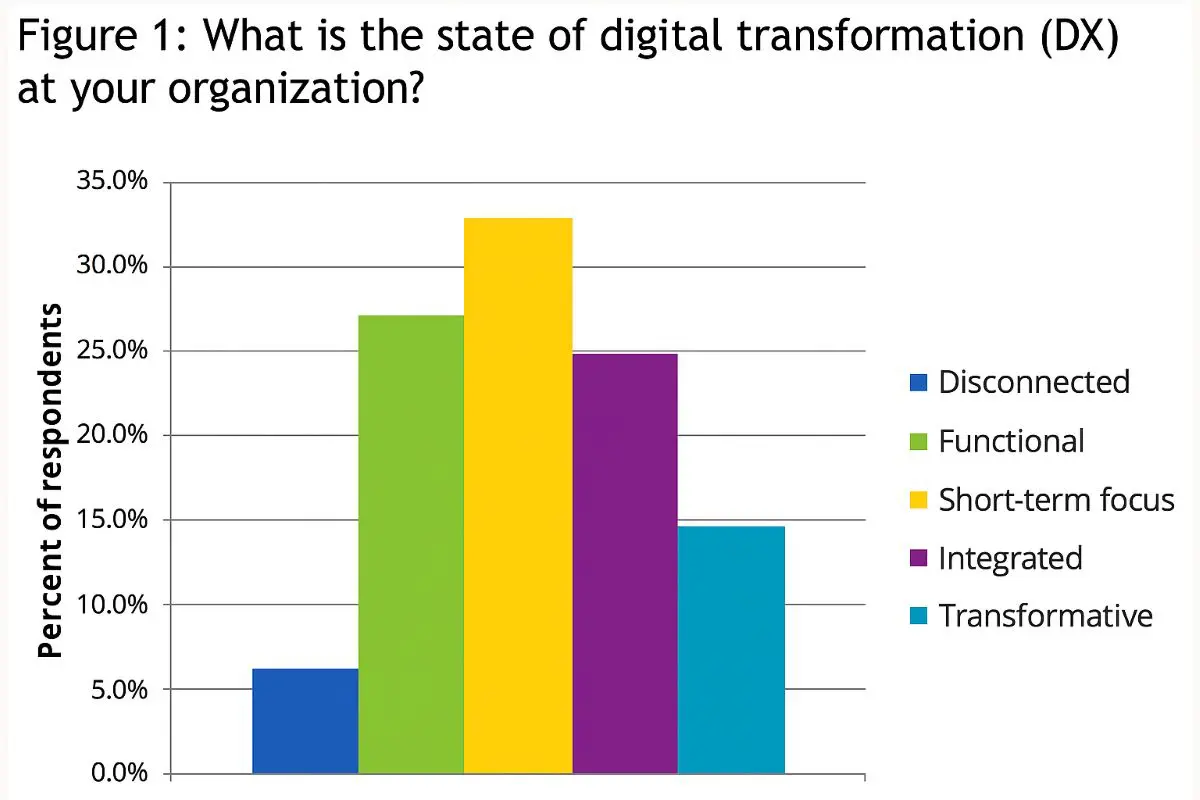Top Digital Transformation Companies in 2026: Trusted Partners for Innovation

Gartner forecasts total IT budgets to reach $5.74 trillion next year, highlighting both the scale of opportunity and the risk of misalignment. For CIOs and CTOs, this isn’t optional spending. It is a strategic lever to drive growth, resilience, and competitive edge. But as the vendor landscape expands with digital transformation agencies and niche system integrators, finding top digital transformation companies in 2026 becomes increasingly challenging.
This guide helps Digital Strategy Directors, Innovation Leads, and Procurement teams cut through the noise. It identifies what makes a true transformation partner, names the best of them, and offers concrete criteria to support informed, board-level decisions.
from 25 countries outsourced software development to Relevant
We provide companies with senior tech talent and product development expertise to build world-class software.
Comparison table: top digital transformation companies
This quick comparison table highlights companies leading digital transformation. It focuses on four things executives usually care about most:
- average client rating
- years in business
- key customers
- each company’s specialty in digital transformation
Use it as a reference point. The next sections provide a detailed look at each provider.
| Company | Avg. client rating | Years in market | Notable clients (public) | Specialties (digital transformation focus) |
| Relevant Software | 4.9 / 5 ★ | 12 | AstraZeneca, Norwegian | Cloud-native apps and AI analytics for regulated sectors |
| Accenture | 4.8 / 5 ★ | 36 | P&G, JPMorgan, Shell, Vodafone | Enterprise-wide GenAI + cloud programmes tied to growth goals |
| Deloitte Digital | 4.8 / 5 ★ | 13 | Walmart, Verizon, Starbucks | Customer-experience re-design and SAP / Salesforce modernisation |
| IBM Consulting | 4.7 / 5 ★ | 22 | Citi, Toyota, Santander | Hybrid-cloud migrations and WatsonAI for core systems |
| Capgemini | 4.7 / 5 ★ | 58 | Airbus, EDF, Volvo | Digital twins and sustainability analytics across supply chains |
| Cognizant | 4.8 / 5 ★ | 31 | Humana, MetLife, L’Oréal | GenAI Factory bots and large-scale process automation |
| Infosys | 4.6 / 5 ★ | 44 | Lufthansa, Siemens, Microsoft | Topaz AI, Cobalt cloud templates, agile DevOps |
| Thoughtworks | 4.6 / 5 ★ | 32 | TBC Bank, Bluestone | Agile enablement and evolutionary architecture with data & AI |
| Globant | 4.8 / 5 ★ | 22 | Google, Disney, EA | Studio model for AI, blockchain, gaming, and digital experience design |
| EPAM Systems | 4.8 / 5 ★ | 32 | eBay, Colgate-Palmolive, Adidas | Secure cloud platforms and omnichannel commerce engineering |
What makes a company a digital transformation leader?
Not every provider claiming to be “digital” delivers real change. True digital transformation software companies stand apart in four ways: their ability to support the full scope of transformation, sector-specific knowledge, consistent innovation, and proven impact on meeting business needs and achieving business success.
The best firms do more than build systems. They reshape business models, align teams, and integrate strategy, technology, and execution. These companies ensure not just smooth rollouts but long-term, measurable value. They plan for challenges, handle complex problems, and take responsibility even after the project is finished — all signs of a top digital transformation company today.
End-to-end service capabilities
A real transformation partner does not wait for instructions. It sets goals, defines a digital transformation roadmap and strategy, and moves through each iteration. The same group handles every phase, from strategy and product development to post-launch optimization and support.
The top digital transformation companies clarify objectives at the outset. They map financial, operational, and customer outcomes, raise service quality, and implement solutions with strict security, compliance, and scalability. Each business process is linked to measurable value through seamless data integration, driving sustainable business transformation.
These partners deploy advanced technologies such as cloud-native architecture, microservices, and artificial intelligence. Such digital transformation examples remain flexible, API-first, and ready to plug into modern digital channels and supply-chain platforms. With DevOps and CI/CD, they cut delivery time without sacrificing reliability. After deployment, they refine systems through real-time user data to support constant growth.
Most important: the same team stays from discovery to rollout, building trust, accountability, and results.
Industry-specific experience
Context matters. A firm that succeeds in healthcare may struggle in retail without domain-specific expertise. In regulated sectors like finance, healthcare, and pharma, transformation depends on understanding audit trails, documentation flows, and local compliance standards.
Top digital transformation companies in IT bring not just technical depth but embedded knowledge of vertical-specific operations. They apply insights from real examples of digital transformation to anticipate friction, shape compliant architectures, and avoid delays triggered by risk teams or outdated governance models.
This experience cuts discovery time, reduces delivery risk, and ensures that digital transformation strategies lead to faster returns and a strong competitive advantage, not just functional upgrades.
Innovation track record
Real innovation is evident in daily operations, not in glossy slides. The best digital transformation companies allocate R&D budgets, build reusable modules, and adopt new technologies only where they add measurable value. Leaders in business digital transformation roll out internal AI agents, run pilot tests with advanced data science, and automate platform releases.
They back these efforts with robust employee training programs, extend improvements through the supply chain, and capture field data with IoT sensors that feed accurate data management pipelines.
Forrester notes that frequent releases with AI active in live environments signal a mature digital transformation consulting practice. Top firms watch market trends and convert proven ideas into mobile apps, digital channels, and resilient data stacks.
This focus on clear, measurable gains turns corporate digital transformation from theory into daily practice, creating platforms that adapt to shifting markets and evolving customer needs.
Client impact and results
Top digital transformation vendors focus on business outcomes such as faster time to market, improved user satisfaction, and reduced operating costs. Many back their claims with independently verified digital transformation case studies and analyst reports.
These digital transformation service providers don’t deliver a platform and exit. They stay involved through quarterly reviews, live dashboards, and ongoing data integration work that keeps insights flowing into every business process. Some link fees to outcomes, underscoring confidence in long-term value.

In short, the best digital transformation companies don’t sell change. They make it measurable.
Top 10 digital transformation companies in 2026
Nearly 7 in 10 CIOs say their enterprise digital transformation efforts stalled due to misaligned vendors or a lack of delivery maturity. In 2026, the difference between progress and wasted spend often comes down to one decision: choosing the right partner.
Below is a curated list of the ten companies leading digital transformation that enterprise leaders trust most frequently this year. These firms stand out not for their size, but for their ability to turn complex strategies into sustained business value through real-world execution, measurable outcomes, and long-term accountability.

1. Relevant Software
Overview: Relevant Software is an outsourced development partner with more than 12 years of commercial delivery. The company employs over 100 professionals, 92% of whom are senior- and middle-level engineers. Since its founding in 2013, Relevant has completed projects for roughly 200 clients and now serves organisations across North America, Western Europe, and the Nordic region.
Core Capabilities: Relevant Software specializes in custom web and mobile application development, staff augmentation, digital transformation, and AI implementation. Its teams of senior developers, designers, and strategists ensure digital transformation best practices, from prototyping to daily releases, with strategic roadmaps clearly tied to business outcomes.
Key industries served: Relevant Software’s expertise is centred around fintech, healthcare, logistics, and energy, areas where privacy, data security, and regulatory compliance are essential.
Clients: AstraZeneca, Ossur, Volkswagen Genser, Norwegian, RED Driving School, First Home Coach, Vilmer.
What sets them apart: Relevant Software’s senior-lean talent mix, proactive communication style, and focus on tying each technical choice to clear business goals make it a reliable partner for larger digital transformation solution providers.
2. Accenture
Overview: Founded in 1989, Accenture has evolved into a global powerhouse of professional services. Today, the firm counts roughly 750,000 specialists working in more than 200 cities across 49 countries and reports annual revenue above US$ 64 billion (FY 2024). Its scale allows it to manage complex, multi-continent digital transformation programmes that touch every major industry.
Core capabilities: Accenture’s portfolio spans digital strategy, agile operating-model design, AI-driven analytics, and full-stack cloud migration. Each offering is tightly linked to a client’s business objectives rather than treated as a stand-alone technology project.
Key industries served: This approach has proved valuable across an exceptionally broad client base that includes financial institutions, healthcare providers, manufacturers, retailers, telecom groups, energy majors, and even national governments.
Clients: Procter & Gamble, JPMorgan Chase, Shell, Vodafone
What sets them apart: What truly differentiates Accenture is its 360° Value framework. Every engagement is measured not just on profit, but also on customer experience, workforce growth, and sustainability outcomes — an approach designed to deliver results that last well beyond the initial go-live date.
3. Deloitte Digital
Overview: Launched in 2012 inside Deloitte, Deloitte Digital unites Big Four strategy with a creative-tech studio model. More than 110,000 specialists across 80 studios carry out global digital transformation projects.
Core capabilities: Deloitte Digital drives large-scale digital modernisation through customer-experience design, enterprise-platform upgrades such as SAP and Salesforce, cloud re-platforming, cybersecurity, and data-privacy advisory.
Key industries served: Retail and e-commerce, life sciences, federal and state government.
Clients: Walmart, Verizon, Starbucks, UK Government.
What sets them apart: Deloitte Digital blends board-level consulting with agency-grade creativity and enterprise engineering, enabling human-centred solutions that satisfy strict governance and compliance needs while accelerating digital transformation.
4. IBM Consulting
Overview: IBM Consulting (formerly IBM Global Business Services), operating under its current brand since 2021, builds on IBM’s research heritage to guide large-scale digital transformation. Roughly 140,000 professionals support clients across 175 markets and generate about $20 billion in annual revenue.
Core capabilities: The firm migrates complex workloads to the cloud while maintaining legacy stability, modernises mainframes, applies Watson-powered analytics for actionable insights, and automates high-volume processes to cut manual effort and boost accuracy.
Key industries served: Banking, public services, and industrial products clients rely on IBM for regulation-aligned digital transformation roadmaps.
Clients: Citi, Vodafone, Toyota, Banco Santander, Delta Air Lines.
What sets them apart: IBM Consulting combines a deep intellectual-property library of more than 110,000 patents with quantum-safe architectures and decades of success in tightly regulated sectors, giving enterprises a partner that can modernise safely and at scale.
5. Capgemini
Overview: Founded in Paris in 1967, Capgemini is a global technology and consulting leader. About 360,000 people work in 50 countries, generating annual revenue above €22 billion.
Core capabilities: The firm leads digital-transformation programs that move core workloads to the cloud, modernise ERP and PLM platforms, digitise supply chains, and redesign customer journeys. It pairs these with strengths in data analytics, intelligent automation, and sustainability assessments through its “Intelligent Industry” portfolio.
Key industries served: Manufacturing, retail, finance, and public-sector clients value Capgemini’s human-centric delivery style.
Clients: Airbus, EDF, Volvo, HM Revenue & Customs, ENGIE.
What sets them apart: Capgemini’s Green-AI and sustainability frameworks allow clients to meet environmental targets while modernising operations, making the firm a preferred partner for organisations that view digital transformation and climate goals as equally critical.
6. Cognizant
Overview: Cognizant, incorporated in 1994 and headquartered in New Jersey, employs about 347,000 associates and records roughly $20 billion in annual revenue. The company structures delivery around Industry Advisory, Digital Business & Technology, and Operations.
Core capabilities: Cognizant drives digital transformation through legacy-system renewal, large-scale cloud migration, customer-experience redesign, and enterprise process re-engineering. The firm also offers customised large-language models through its GenAI Factory, intelligent automation, and robust governance frameworks.
Key industries served: Healthcare, insurance, consumer goods
Clients: Humana, MetLife, L’Oréal, Cigna, The Guardian Life.
What sets them apart: Cognizant’s domain-specific knowledge and the “Rewire for AI” initiative allow it to quickly and effectively embed AI into client operations.
7. Infosys
Overview: Infosys, founded in 1981 and listed in India and the US, employs about 340,000 people and posted US$ 19 billion in FY 2024 revenue. Delivery hubs in 56 countries support a federated talent model that pairs local client squads with offshore engineering centres.
Core capabilities: Beyond its proprietary AI platforms, Infosys is a long-standing digital-transformation partner. The firm modernises core systems, migrates workloads to the cloud, and re-engineers business processes with agile delivery, data analytics, and strong cybersecurity controls, all under its Cobalt cloud framework and Topaz automation suite.
Key industries served: Banking, telecom, logistics
Clients: Lufthansa, Siemens, Microsoft
What sets them apart: A deep bench in large-scale digital modernisation, coupled with proprietary platforms and an ethical, sustainability-focused charter, positions Infosys as a trusted partner for enterprise-wide innovation initiatives.
8. ThoughtWorks
Overview: Founded in 1993, ThoughtWorks now counts 12,000 technologists in 18 countries. The firm built its reputation on agile, continuous delivery, and evolutionary architecture. Its work spans three global capabilities: Digital Transformation, Data & AI, and Enterprise Modernisation.
Core capabilities: ThoughtWorks offers digital transformation, agile and DevOps implementation, technology roadmaps, organizational transformation, and portfolio management.
Key industries: They work across various industries, which include financial services, retail, media, and technology, often with clients seeking to become more adaptable and responsive to market changes.
Clients: TBC Bank, Bluestone
What sets them apart: ThoughtWorks differentiates itself through deep engineering expertise, a pragmatic transformation approach, and emphasis on nurturing agile cultures within client organizations.
9. Globant
Overview: Founded in 2003 in Buenos Aires and now listed on the NYSE, Globant has grown to about 29,000 specialists across 30 countries. Its “studio” model encourages focused innovation in AI, blockchain, and gaming, giving clients ready access to niche expertise under one roof.
Core capabilities: Globant delivers digital experience design, AI-powered automation, process optimisation, Salesforce integration, and data-driven content marketing, turning complex ideas into scalable products.
Key industries served: Airlines, automotive, consumer goods, education, energy, finance, gaming, healthcare and life sciences, hospitality and leisure, media and entertainment, retail, and sports.
Clients: Google, Disney, Electronic Arts, Santander Rio, National Geographic.
What sets them apart: Globant’s “studio” model and AI-driven approach to reinventing businesses set them apart. They focus on the creation of “phygital” experiences that blend the physical and digital worlds, and their emphasis on AI Agents for business automation and enhanced decision-making highlights their forward-thinking strategies.
10. EPAM Systems
Overview: EPAM Systems, founded in 1993 in Princeton and now present in 45 countries, employs 60,000 engineers and posts roughly US$ 5 billion in annual revenue. The firm’s structure centres on Digital Platform Engineering, Digital Product Design, and Intelligent Enterprise.
Core capabilities: EPAM’s digital transformation services shape processes, lift user experience, and streamline operations. The team provides ServiceNow and Magento expertise, business automation, and database design, built on custom software craft, cloud migration, and rigorous cybersecurity.
Key industries served: Energy, fintech, retail
Clients: eBay, Colgate-Palmolive, Liberty Global, S&P Global, Adidas.
What sets them apart: An engineering-first culture and holistic delivery model let EPAM deliver secure, scalable digital foundations and keep innovation moving for every client.
How to choose the right digital transformation partner
Selecting a digital transformation vendor is more than a procurement task; it is a strategic decision for companies that need digital transformation. The partner you appoint will shape how your organisation competes, scales, and innovates. A strong vendor addresses core digital transformation challenges, adds far more than technical skill, and becomes a contributor to your business strategies.
To make the right choice, evaluate vendors through three essential lenses. Each lens offers practical tests that separate seasoned transformation leaders from surface-level providers.

Align on strategy and goals
The most successful digital transformation projects begin with one simple question: What does success look like for your business?
Start by anchoring your initiative in a clear commercial goal. This could be higher customer satisfaction, faster product delivery, improved customer engagement, or the creation of new revenue streams. Translate that goal into measurable KPIs, reducing onboarding time, increasing transaction volume, or cutting manual work through process automation.
Why this matters:
- Sharper focus: Clear KPIs help teams stay on track and avoid going off course.
- Quicker decisions: Everyone works toward business goals, not just tech preferences.
- Greater accountability: Progress is tracked using metrics your leadership actually cares about.
What to look for in a vendor:
- Workshops that begin with understanding your business goals and KPIs rather than jumping into technical details.
- A strategic plan that compares your performance to market benchmarks and identifies areas for improvement.
- A delivery roadmap that connects every feature to a business result, such as improved forecasting with predictive analytics or shorter time to market for new products.
📌 Tip from Relevant Software experts: If a vendor focuses heavily on tools or frameworks without tying them to growth goals, customer retention, or financial impact, that’s a red flag. Reset the conversation around outcomes.

Source: CIO
Assess technical and cultural fit
The best digital transformation partners bring not only talent but also adaptability and shared values. Even a highly skilled team will slow progress if they can’t work well together, shift priorities when needed, or communicate clearly.
Look for:
- Integrated teams: The best projects bring developers, QA experts, designers, and product managers together into one strong team. These teams work closely, make fast updates, and avoid working in silos — key to success in digital transformation consulting services.
- Clear communication: Look for vendors who offer regular updates, live progress tracking, shared documents, and quick sprint cycles (like every two weeks) to keep everyone on the same page.
- Flexibility in action: Ask how they’ve handled unexpected changes during past projects. A good team spots risks early and adjusts the plan without causing delays.
Tip from Relevant Software experts: Ask for a project story where the scope expanded by 30% or changed direction. A capable company with digital transformation skills should walk you through how they stayed on schedule, maintained quality, and still delivered strong outcomes, such as improved customer engagement or faster rollout of a new platform.
Bonus: process automation
A mature partner often brings prebuilt libraries, automation frameworks, and platform accelerators. These reduce effort in repetitive areas, such as testing, deployment, and workflow configuration, allowing your team to focus on high-impact innovation.
Related reading: see how these principles apply in a highly regulated industry in our guide to digital transformation in financial services.
Look for long-term value
Digital transformation is not a one-time launch. What happens six months later matters even more than your go-live date. Your ideal digital transformation consulting firm stays with you beyond delivery, helping adapt the platform to new demands, new data, and evolving customer expectations.
A strong, long-term partner should offer:
- Post-launch support: A clear plan for regular updates, performance reviews, feature enhancements, and technical maintenance.
- Ongoing business metrics: Don’t just track system uptime or how often people use the product. The best teams also monitor business results, such as the number of customers who leave, the speed at which issues are resolved, and the cost of each transaction. Advanced partners use predictive analytics to catch problems early, before they affect your outcomes.
- Growth readiness: A plan that shows how your systems can support new user groups, geographies, or AI modules without requiring a rebuild.
Tip from Relevant Software experts: Request a detailed case where the vendor supported a platform for two or more years. What did they improve? How did they measure value? Did the transformation result in new revenue streams, lower costs, or faster go-to-market for new services? A post-launch digital transformation assessment should measure adoption, cost per transaction, and return on investment (ROI) growth on a quarterly basis.
Final thoughts: Embracing the future with the right DX partner
Before drawing conclusions, review the success factors in sequence. Digital transformation journey follows a clear chain of cause and effect: set business goals first, let those goals guide every technical choice, select a partner who delivers on those choices, and keep the platform relevant through ongoing improvement. Three linked conditions make the logic clear:
- Ground the programme in a short list of business goals, profit growth, cost control, and faster launch cycles, so each requirement has a clear purpose and success becomes easy to measure through well-defined digital transformation metrics.
- Choose a partner who links every backlog item to those goals and works in step with your culture, shares rituals, raises risks early, and adapts to change. This reflects sound digital transformation leadership and keeps delivery on course when priorities shift.
- Ensure the same partner remains after launch, tracks live KPIs, removes technical debt, and adds new features as markets evolve, all under strong digital transformation governance that compounds value rather than letting it fade.
When all these pieces come together, companies can turn ideas into action, and digital transformation becomes a long-term driver of growth, not just a one-time project. Businesses that meet all three conditions continue to improve even after launch and stand out as top digital transformation companies in IT.


Hand-selected developers to fit your needs at scale! Let’s build a first-class custom product together.

